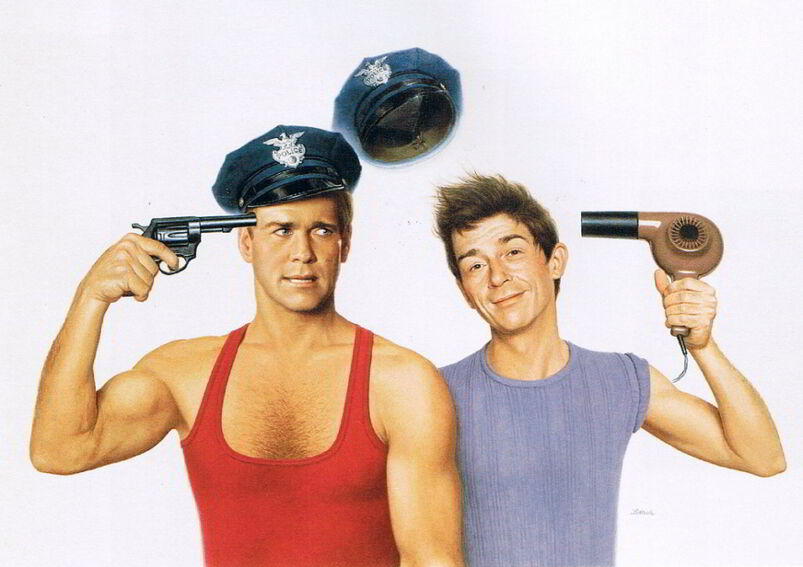
Welcome back to our queer film retrospective, “A Gay Old Time.” In this week’s column, we’re revisiting 1982’s Partners, a forgotten mainstream buddy comedy about a straight cop and a gay cop.
Last week, with our conversation around 1982’s Parting Glances, we discussed how that movie fit into a certain trope of the time period within queer film: the naturalistic and voyeuristic look at the queer community, made by queer filmmakers for queer audiences, as a way of fighting against the toxic narratives that the outside world was throwing at us. These films made up a small, independent, and very niche filmmaking trend.
This week we’ll take a look at the other side of the same coin. Another trope with queer narratives that seems to have been a pattern at the time, but one that existed in more mainstream films aimed at a broader audience: the hesitant immersion of someone from the outside into the gay world. We’ve actually tackled this trope before in the column, with films like Cruising (with whom this week’s film shares the most DNA),The Gay Deceivers, and Philadelphia.
Your dose of fabulosi-TEA
Subscribe to our newsletter for your front-row seat to all things entertainment with a sprinkle of everything else queer.
In these films, a straight person (typically a man set on their prejudiced beliefs) is forced to either interact with or pose as someone from the gay community. The main arc usually involves them humanizing people that they considered pariahs beforehand, although often stepping out of their world at the end. They learn their lesson, and then they turn away and go back into their lives.
The Set-Up
This week, we’re taking a look at this narrative in a mostly harmless movie with 1982’s Partners, in which police officer Sergeant Benson (Ryan O’Neal, who passed late last year) is forced to literally partner up with fellow investigator Kerwin (John Hurt), an openly gay man, as they pretend to be a couple in order to find a murderer that has been killing gay men.
The film combines two tropes that the few mid-century mainstream movies with LGBTQ+ themes loved to have: the odd coupling between a straight and a gay person, and the aforementioned hesitant immersion of the heterosexual character into the gay lifestyle.
Cruise Control
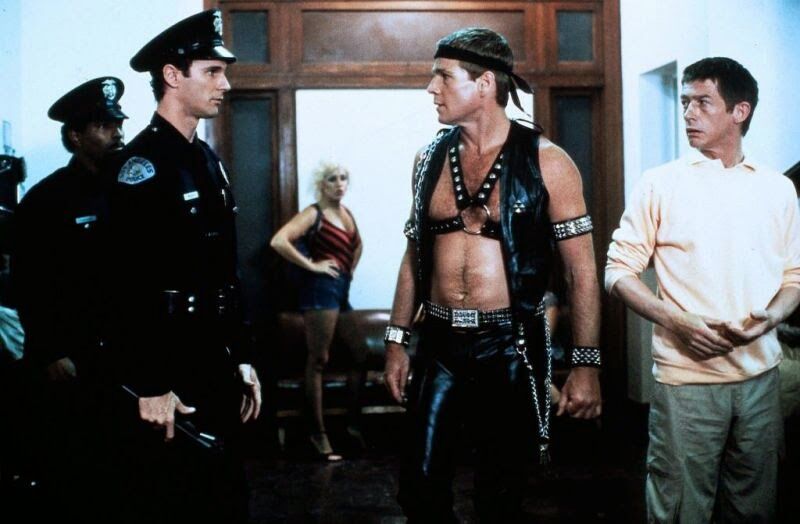
The film borrows a lot from the 1980 William Friedkin classic Cruising, to the point that at times it feels like a comedic retelling of the same basic beats: a cop is forced to infiltrate the gay community to solve a string of targeted murders, and finds that the world is deeper and more complex than he initially thought.
But while Cruising is thornier and actually seems to make an effort to understand and contextualize the gay community immediately pre-AIDS, Partners is a superficial exercise that, instead of attempting to empathize with LGBTQ+ folks, it just uses them as background to showcase stereotypes and make a comical contrast of how out of place a “traditionally manly” cop operates in this strange world.
Related:
Queer Fatale: 10 sexy, gay erotic thrillers to titillate and palpitate
You won’t be able to look away.
Laughing With Us, Or At Us?
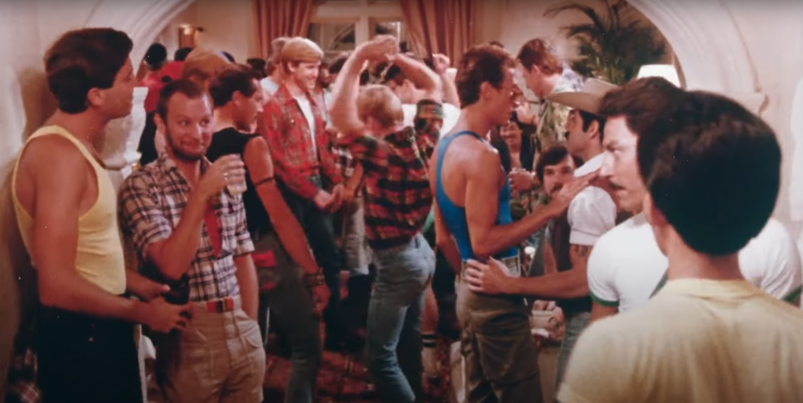
At times it feels like it just goes through a list of gay jokes and uncomfortable scenarios for the characters, following a template for this very specific type of movie: the initial disgust that the straight man has for the gay person he is forced to cohabit with, the embarrassment when a woman mistakes them for gay, the eventual seduction and sex with that same woman, the discomfort of being ogled and hit on at a gay party or bar, the almost ritualistic wearing of the leather garment (which we don’t necessarily begrudge here since Ryan O’Neal wears them very well, but still)… It is exactly the movie you would think it is when you read the premise.
To be fair to the movie, and trying to put aside the more than four decades of hindsight, it does portray the gay community as charming and quirky at best, and harmless at worst. They are people with their own worlds and languages and community, but that are better looked at from the outside.
It may not make us complex humans equal to the protagonists, though it thankfully avoids villainizing or condemning our behavior. Which is the bare minimum with today’s view, but it could hold some actual power back then, especially with a big star like O’Neal at the helm, playing a character who learns not only to embrace but in some way love his partner.
Life Partners
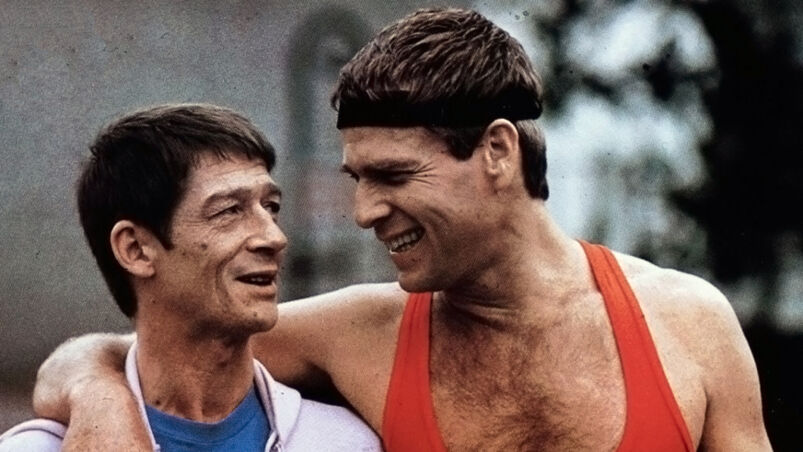
That is the aspect of Partners that feels different from others in this same broad category. Although definitely relegated to a supporting role, Kerwin is as complex a character as the gay sidekick can get. He serves as the guide and ironically, the “straight man,” for Sgt. Benson into the gay community.
The arc (and maybe even intentionally, the gimmick) of the film is that the more time the two spend together pretending to be a couple, the more they get to learn about each other, and the more their dynamic actually resembles an actual marriage.
They learn about each other’s food tastes, and complain about their hygiene, and can anticipate their needs and wants. It shows, in a very limiting way, that coexistence between two male partners can be achieved with harmony and peace, even if it’s played for laughs.
The Verdict Is In
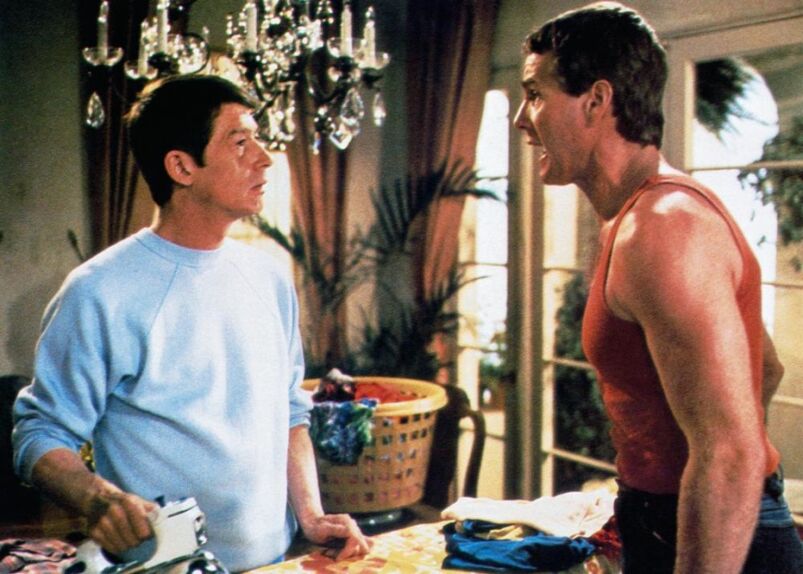
Partners is by no means a revolutionary movie, or one that stands as a particularly strong example of how the trope of the straight and the gay world co-mingling reflected actual dynamics, for better and for worse. It’s a broad comedy, with broad performances, and a nice but shallow message of live-and-let-live. It’s interesting to see how it fits into the gay portrayals of the time, and how those portrayals compare to the ones we have now. Which shockingly, probably wouldn’t look too different.
The tension between the straight and the gay world has remained the same (one could argue, it has been enhanced in many ways), and although the complexity of the characters may have grown, that same sense of hesitation would probably still exist if a movie with the same plot were made today. Not that we need it—we definitely don’t.
Partners is available for digital rental via Amazon Prime Video and AppleTV.















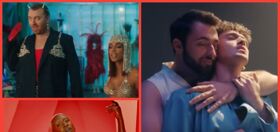




FreddieW
Somehow missed that movie. I’ll have to watch it. Ryan O’Neal is in my very favorite movie — “What’s Up Doc”. He was quite a hunk when he was young.
Pietro D
I wouldn’t know from personal or generational experience but from films l’ke “What’s Up Doc?” which you quoted, to Barry Lyndon, Paper Moon, Love Story (they loved the film in 1970, they tell me) and more……. I agree, he was a hot dude and HE COULD ACT which was not the general concensus. He was roasted for getting an Oscar Nomination for LOVE STORY, 1970. which he had zero chance of winning. The nomination came chiefly due to the phenomenal success of “Love Story”, I believe the top money maker in 1970. Too bad he did not have a more enduring career.
Kangol2
Ryan O’Neal was pitch-perfect in What’s Up, Doc? and Paper Moon, both of which I could watch over and over. They are laugh out loud funny and each has excellent performances by his co-stars, Barbara Streisand (just amazing) in the former and his daughter, little Tatum O’Neal and Madeline Kahn, in the latter. Two perfect films! Love Story is a tear-jerker and not a great film but it was perfect for its moment, and Ali McGraw is at her most beautiful, so that film rocked people’s worlds.
mildredspierce
Couldn’t take my eyes off him and crotch-watched him in Paper Moon and What’s Up Doc. But Madeline Kahn stole the show in both! What a talent she was.
barbrasings
Kangol2 — I know who BARBRA Streisand is, but who is BARBARA???
Actually, Ryan and BARBRA made two movies together — What’s Up, Doc? and The Main Event. Ironically, both films were stolen (at least partly) by supporting actresses — Madeline Kahn in What’s Up, Doc? and Patti D’Arbanville in The Main Event (as the girl with the reeeeeally bad cough).
Kangol2
Yep, you got me, it is BARBRA Streisand. Now do you know who I’m talking about? The song bird, actor, director, force of nature–one of the all time greats?
spiralx
But… why John Hurt ? Great Brit actor though he was, even then?
I watched “Kiss Me Guido” again (goes along very similar lines), and the all-American cast do a fine job.
dbmcvey
John Hurt was not the problem with this movie.
Mr.Gavin Elster
Ryan DOES look sweet in that leather drag. Woof! I heard he spent at least, a little time, on that famous, gay, Hollywood casting-couch? So did a couple of other VERY straight, old (literally and figuratively) A-listers. I would mention them,by name, but they’re still alive. And one is known for being mean, and vindictive.
dbmcvey
I saw this in the theater when it came out. A really bad movie. Trying to do “Cruising” as a comedy and it was really, really off putting.
LumpyPillows
Gay men are being murdered in this movie. At least they are trying to find the killers, instead of ignoring them. This was unusual for the time.
The movie was OK.